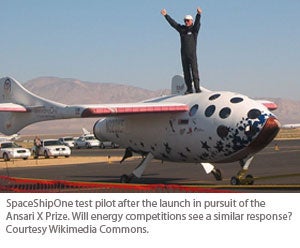What will it take to foster and spread the ideas and practices needed for sustainable development? One thing that has stirred innovative thinking are the positive results of recent prize competitions.
 Perhaps the most notable of these – so far – has been the Ansari X Prize. The Ansari X Prize was a space competition in which the X Prize Foundation offered a US$10 million reward for the first non-government organization to launch the same reusable manned spacecraft into space twice within two weeks. It was modeled after early 20th-century aviation prizes, and aimed to spur development of low-cost spaceflight. There is real brilliance in this idea, but in the specific terms of the prize, which prompted other competitors – each of whom spent far more than the prize money. The prize, claimed by Scaled Composites in 2004 for its Tier One project launched or accelerated a diverse portfolio of private space ventures, “spaceports”, and an industry now worth billions.
Perhaps the most notable of these – so far – has been the Ansari X Prize. The Ansari X Prize was a space competition in which the X Prize Foundation offered a US$10 million reward for the first non-government organization to launch the same reusable manned spacecraft into space twice within two weeks. It was modeled after early 20th-century aviation prizes, and aimed to spur development of low-cost spaceflight. There is real brilliance in this idea, but in the specific terms of the prize, which prompted other competitors – each of whom spent far more than the prize money. The prize, claimed by Scaled Composites in 2004 for its Tier One project launched or accelerated a diverse portfolio of private space ventures, “spaceports”, and an industry now worth billions.
Since 2004, prizes have been launched. One, technology-focused competitions is the i6 Green Challenge by the US government which will reward $1 million to each of six teams around the country with the most innovative ideas to drive technology commercialization and entrepreneurship in support of a green innovation economy, increased U.S. competitiveness and new jobs. There are others with concrete objectives to addressing key issues in ecological conservation, social networking, transparent national governance, and democratic transitions of power (for example, the Mo Ibrahim prize).
Can this idea work in energy, climate, and development?
A recent UN conference brought together foundations, multinational groups, and development agencies to examine what sort of prizes might stimulate innovation in climate protection and sustainable development. Why do some prizes succeed, while others have problems? How can we create successful ones for approaches to energy, climate, and development?
First, there is a shortage of private sector investment in sustainable development and energy access. This needs innovative new approaches, which well-designed prizes for both local and global solutions could meet.
There are important lessons to learn, however. In 2007 Sir Richard Branson and Vice President Al Gore launched a $25 million climate prize. The specific terms of the prize – which has not yet been claimed, is for an approach that, “will remove at least one billion tonnes of carbon per year from the atmosphere.” This is urgently needed but as Branson and Gore are finding, verifiable, climate ‘solutions’ can be both hard to find and verify.
In development and energy, many attractive approaches warrant plans and proposals, and this blog is a call for submissions and discussion.
Technology specific advances are needed, such as: low-cost and robust electricity meters for homes in both rural and urban areas in developing nations; integrated solar panels that cost little more than a regular roof, ‘green energy systems’ that make mini-grids and distributed energy technologies much more accessible and commonplace, and affordable home-based gassifier units to turn household and industry waste into energy.
Implementation and management prizes are needed to move ideas from experiments to the mainstream; these could include leadership prizes for the dissemination of improved cookstoves or energy-efficient appliances, on- and off-grid lighting solutions, and for implementing market reforms that reduce fossil-fuel subsidies, or reduce market barriers for clean energy technologies to enter markets.
The International Ashden Awards, for example, give cash prizes for local sustainable energy initiatives. This year’s top prize winner, Toyola Energy, produces efficient charcoal cookstoves for households in Ghana. (Applications for the 2012 awards are due by October 18.)
The critical area, inspired by the Mo Ibrahim prize, is one that requires a very careful planning but has incredible opportunity to spur political commitment are green leadership awards. Guide a Feed-in-tariff through the legislative process? Develop a verification system to reward green businesses for energy efficiency upgrades? All of these would be great award candidates, but the real hope in this blog is to generate a community of thought-leaders designing and critiquing ideas.


Join the Conversation